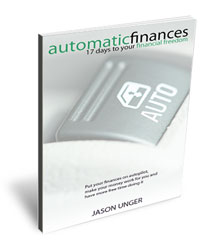
It’s time for Day 3 in the posting of Automatic Finances: 17 Days to Your Financial Freedom.
See the previous posts here: Introduction, Day 1 and Day 2.
******************************
After everything you’ve done to organize your finances, it’s time to take a look at where you stand.
Whatever your situation – whether your net worth is high, low, or even negative – remember that this is a starting point. You’re at the beginning of a new stage in your financial journey, and from here on, everything is looking up.
Thankfully, finding your net worth using Yodlee (and nearly every other account aggregator) is easy, so the workload today is light.
First, before we find it, you need to know why it’s important.
Your net worth is:
- the difference between your assets and debts
- a full picture of where you stand financially
- the best barometer to measure your financial success
Too often, our society places value in people with high incomes and just as high expenses. Celebrities and athletes may pull in multi-millionaire dollar salaries, but if they’re spending all of it, their net worth isn’t increasing.
Your net worth is dependent on how much you save and invest – not on how much you spend.
What’s My Net Worth?
If you’re using Yodlee, finding your net worth is as easy as a few clicks.
When you’re logged in and looking at your Account Summary, click on the link that says “Net Worth Statement.”
Your assets and liabilities will be listed and your net worth calculated.
Adding Offline Assets and Home Value
Since Yodlee is only looking at your financial accounts, it doesn’t add in your offline assets to your net worth.
This would include:
- cars
- jewelry
- art
- collectibles
- anything else of significant value
Of course, what may be your biggest asset – your home – isn’t included either.
Thankfully, Yodlee offers the option to add in these offline assets, including an estimated value of your home, in your net worth calculation. Using the “Quick Links” on the left-hand side of your Net Worth Statement, you can add in your offline assets and recalculate.
Is My Net Worth Up to Par?
Comparing your net worth to other people isn’t an exact science, but we can do a little bit of calculation.
In their book, “The Millionaire Next Door,” Thomas J. Stanley and William D. Danko researched the habits of millionaires (high net worth individuals) and established a calculator for determining a person’s desired net worth.
They break the results down into three categories: Under Accumulator of Wealth (UAW), Average Accumulator of Wealth (AAW) and Prodigious Accumulator of Wealth (PAW).
To find where you stand, enter your information in the calculator at http://www.banksite.com/calc/wealth.
The Bias in Net Worth Calculations
There’s one bias in the above net worth calculation that may affect you: how old you are. In his popular personal finance blog, The Simple Dollar, Trent Hamm explains why Stanley and Ditko’s formula fails those under the age of 40:
The Millionaire Next Door has a strong anti-youth bias. Early in the book, the authors define a simple rule of thumb for estimating one’s net worth: multiply your age times your realized pretax annual household income from all non-inherited sources and divide by ten. Go on, do it yourself. …
In short, the book often ignores the sacrifices youth make early in their life in order to maximize their earning power later. The reason for this bias is in their sampling: everyone interviewed in the book is already well into middle age.
Hamm offers a more realistic formula for finding your target net worth if you’re under the age of 40:
Target Net Worth = (Age – 27) X Annual Pre-Tax Income / 5
What Really Matters: Your Trends
As much as we may like comparing our net worths with calculators and our friends, there’s a more important factor: the direction your net worth is going.
Now that you know your net worth, it’s important that it starts trending up. Your net worth wants to get more positive, and you’re going to make it happen.
We’ll start that tomorrow.
TIP: When you’re calculating the value of your offline assets and home, remember that prices will fluctuate. Your goods are only worth as much as someone else will pay for them.



